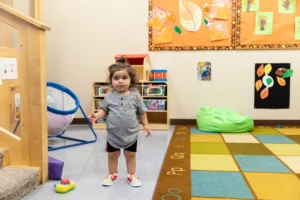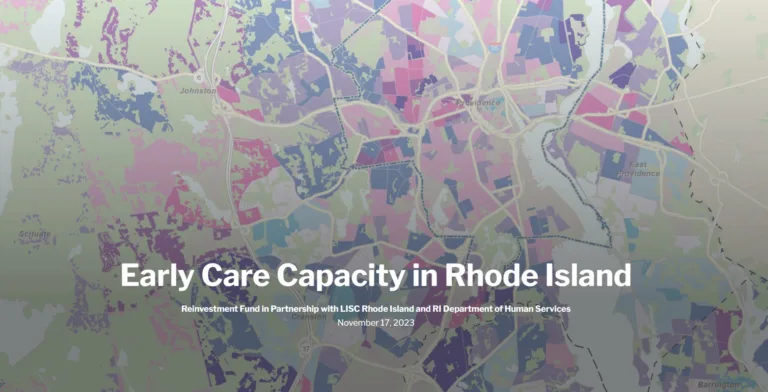 Over the course of the last several years, LISC has engaged in studies designed to support the Rhode Island Department of Human Services in its efforts to understand true child care capacity gaps and to devise targeted and meaningful solutions to grow access to quality child care for all Rhode Island families. Of note are the 2019 Facilities Needs Assessment and the 2021/2022 Rhode Island Child Care Assessment, both of which articulate comprehensive and interconnected recommendations for actions Rhode Island should pursue.
Over the course of the last several years, LISC has engaged in studies designed to support the Rhode Island Department of Human Services in its efforts to understand true child care capacity gaps and to devise targeted and meaningful solutions to grow access to quality child care for all Rhode Island families. Of note are the 2019 Facilities Needs Assessment and the 2021/2022 Rhode Island Child Care Assessment, both of which articulate comprehensive and interconnected recommendations for actions Rhode Island should pursue.
 As we undertook both of those studies, we heard frequently that there is a broad understanding that Rhode Island lacks sufficient quality child care aligned with all family needs. No one questioned this premise but many key stakeholders, from government to philanthropy to developers and even providers themselves, expressed a need to understand the issues at a more granular level. Many things contribute to a lack of quality care. Financial nuances, workforce challenges, shortage of quality infrastructure, and some misalignment between individualized family needs and preferences and existing supply all factor in to actual availability of care. Better understanding some of these variables is essential to helping the Department of Human Services and other leaders fully grapple with the complex array of solutions needed to stabilize the system. For the purposes of this project, we began at the most rudimentary of levels – pulling together existing data sets into one comprehensive place to create a tool that allows us to understand and actually visualize gaps down to the census tract level based on a variety of criteria including income levels, family types, work, and community trends.
As we undertook both of those studies, we heard frequently that there is a broad understanding that Rhode Island lacks sufficient quality child care aligned with all family needs. No one questioned this premise but many key stakeholders, from government to philanthropy to developers and even providers themselves, expressed a need to understand the issues at a more granular level. Many things contribute to a lack of quality care. Financial nuances, workforce challenges, shortage of quality infrastructure, and some misalignment between individualized family needs and preferences and existing supply all factor in to actual availability of care. Better understanding some of these variables is essential to helping the Department of Human Services and other leaders fully grapple with the complex array of solutions needed to stabilize the system. For the purposes of this project, we began at the most rudimentary of levels – pulling together existing data sets into one comprehensive place to create a tool that allows us to understand and actually visualize gaps down to the census tract level based on a variety of criteria including income levels, family types, work, and community trends.
For those of us deeply immersed in the work daily there are few revelations that emerged from this massive undertaking. But what did emerge was a first of its kind tool (for Rhode Island) that allows community planners, investors, families, advocates, and current providers to to better understand need at the community level. For providers exploring best places to site new programs, we recommend using this data as part of your community needs exploration while developing your business plan. Couple the data with our robust resources on planning for the development of early childhood facilities (here).
To dissect the data and develop the maps, we selected the Policy Solutions arm of the Reinvestment Fund. Their reputation for finding evidence-based solutions to public policy programs has made them a leading national provider for “putting equity on the map”. The team at Policy Solutions led the effort to gather and analyze data and build a robust Story Map which you can dive into below.
As is described in the project summary located here, nearly all communities lack sufficient quality care. This is particularly notable as it relates to quality infant and toddler care. But in some places and for some populations the needs are more dire. With this robust tool in hand, Rhode Island can now more intentionally explore and layer in additional variables such as family preferences, space shortages, and workforce challenges that will help Rhode Island move from merely understanding the problem to planning for solutions. We hope that this tool can also be used for education and advocacy to better engage local community leaders and philanthropy in solutions-focused thinking on Rhode Island’s child care capacity challenges.
 This project pulled from and relied upon a significant number of data sets. Throughout the process the input of a Key Informants Stakeholder Group also helped to guide and localize the work to the Rhode Island market. We would like to express our gratitude to this engaged group of stakeholders named below and offer a particular nod of thanks to Leanne Barrett of RI Kids Count and Lisa Hildebrand of RIAEYC for sharing essential data from their work and projects.
This project pulled from and relied upon a significant number of data sets. Throughout the process the input of a Key Informants Stakeholder Group also helped to guide and localize the work to the Rhode Island market. We would like to express our gratitude to this engaged group of stakeholders named below and offer a particular nod of thanks to Leanne Barrett of RI Kids Count and Lisa Hildebrand of RIAEYC for sharing essential data from their work and projects.
Leanne Barrett, Rhode Island Kids Count
Marykate Bergen, The van Buren Foundation
Julie Boutwell, The Center for Early Learning Professionals
Kristin Caine, Children’s Friend and Service
Nicole Chiello, Rhode Island Department of Human Services
Erin Cox, Local Initiatives Support Corporation
Owen Heleen, Children’s Friend and Service
Lisa Hildebrand, Rhode Island Association for the Education of Young Children
Khadija Lewis-Khan, Beautiful Beginnings Child Care Center
Kara Rocha, Rhode Island Department of Human Services
Kayla Rosen, Office of the Rhode Island Governor
Cassandra Thomas, City of Providence
Mary Varr, Woonsocket Head Start Child Development Association
Anusha Venkataraman, ONE Neighborhood Builders
StoryMap Feedback
Share your thoughts, questions, and suggestions about the StoryMap here


